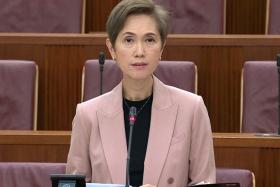All HDB dwellers can get job seeker support if criteria met
All Housing Board flat dwellers who lost their jobs and meet other eligibility criteria can qualify for an upcoming job seeker support scheme.
Moreover, those who do not meet the stated criteria for the SkillsFuture Jobseeker Support scheme can still submit appeals to be considered on a case-by-case basis, Minister for Manpower Tan See Leng said in Parliament on Sept 9.
Seven MPs sought to clarify the scope, flexibility and eligibility of the scheme.
The scheme, to be rolled out in April 2025, will pay Singaporeans and permanent residents who have lost their jobs up to $6,000 over a maximum of six months to help them bounce back into the workforce.
To qualify, job seekers must typically have earned $5,000 or under in average monthly income for the duration of their previous employment in the last 12 months, as well as live in a property with an annual value of $25,000 or under.
They must also not have received any payouts from the scheme in the last three years, among other criteria.
Dr Tan said applications would be assessed via a system that comprises automated checks using available government data and further verification checks done by a dedicated Workforce Singapore team.
In subsequent exchanges with MPs, he clarified that those who live in a property with an annual value of over $25,000, or whose last payout is less than three years ago, could still submit appeals.
Replying to a question from Mr Yip Hon Weng (Yio Chu Kang) on how the $25,000 threshold was set, Dr Tan said the annual value of a property is already used as a proxy to determine households’ wealth for various government support schemes that provide higher benefits to individuals or households with lower means.
“The threshold of $25,000 for the (Jobseeker Support) scheme is aligned with other schemes such as the GST Voucher scheme. This covers about 75 per cent of residential properties, including all HDB flats,” Dr Tan noted.
He also responded to questions from Non-Constituency MP Hazel Poa on why the scheme accords the same benefits to permanent residents as Singaporeans.
To this, Dr Tan said Singaporean citizens receive the most support and benefit in several areas, including housing, healthcare, education and parenthood.
However, permanent residents have expressed their commitment to Singapore and contribute to the Republic’s strengths as a society and economy, he noted.
“So, likewise, we should also support our PRs who fall onto hard times to get into good jobs so that they can support themselves and contribute to our economy,” he said.
In a subsequent exchange, Ms Poa asked how the Government decides whether support schemes differentiate between Singaporeans and permanent residents or not, and whether those in industries that retrench workers more frequently could apply again in under three years.
Responding, Dr Tan said the upcoming scheme is meant to incentivise job seekers to go for interviews and take other steps to get back into the workforce.
“In such circumstances, PRs can receive the same treatment and quantum of benefits, because such schemes, if we support them, enable them to stay employable, enable them to continue to contribute to Singapore economically.”
He added that it also encourages individuals to take responsibility for their own retirement adequacy and their own income security.
This would hopefully mean, by remaining gainfully employed, they will not burden the rest of society, he said.
Dr Tan also acknowledged that the pace of disruptions and change is accelerating, even as the scheme sets out to help job seekers find a better-fitting role that would not see them displaced or unemployed again in a short time.
For this group, he said: “I think that for those who are involuntarily unemployed as a result of circumstances beyond their control, we are prepared to look at it on a case-by-case basis.”
Mr Henry Kwek (Kebun Baru) asked if the Government would consider appeals for those living in private estates with “deserving circumstances”, such as a low per capita income.
In reply, Dr Tan reiterated that individuals who do not meet the eligibility criteria will still be considered on a case-by-case basis on appeal.
Labour MP Patrick Tay (Pioneer), in supplementary questions, sought to clarify how the Ministry of Manpower (MOM) would ensure that professionals who may exceed the $5,000 requirement but still be financially strapped would not be left out of the scheme.
Dr Tan said professionals, managers, executives and technicians at a higher wage level could also face pressures from losing their jobs, but they have a slightly better buffer compared with the lower- and middle-income individuals targeted by the scheme.
Mr Tay also asked if MOM would monitor and take action against companies that cut back on retrenchment benefits or severance packages as a result of the scheme.
On this, Dr Tan said the Government would work very closely with the labour movement and employers to ensure that all workers will continue to be treated fairly.
In another exchange, Workers’ Party MP Gerald Giam (Aljunied GRC) asked how the scheme, which is expected to cost $200 million yearly, would be funded.
He also sought to clarify if an unemployment insurance scheme was considered.
Dr Tan said in his response that feedback indicated businesses face cost pressures and workers wanted to have more take-home earnings.
This was why a scheme fully funded by the Government that provides assistance to tide involuntarily unemployed workers over was deemed the “most nuanced way forward” to start with.
He also noted that today, close to 60 per cent of workers get back into a job within six months of being involuntarily unemployed.
“With the scheme, we believe that an even higher proportion of workers will be able to benefit and get back into a good job faster.”
Get The New Paper on your phone with the free TNP app. Download from the Apple App Store or Google Play Store now

